
Latvia, officially the Republic of Latvia, is a country in the Baltic region of Northern Europe. It is one of the three Baltic states, along with Estonia to the north and Lithuania to the south. It borders Russia to the east, Belarus to the southeast, and shares a maritime border with Sweden to the west. Latvia covers an area of 64,589 km2 (24,938 sq mi), with a population of 1.9 million. The country has a temperate seasonal climate. Its capital and largest city is Riga. Latvians belong to the ethnolinguistic group of the Balts and speak Latvian, one of the only two surviving Baltic languages, a branch of the Indo-European language family. Russians are the most prominent minority in the country, at almost a quarter of the population.

"Dievs, svētī Latviju!" is the national anthem of Latvia. Created in 1873 as a patriotic song, it did not gain official status until 1920.

The Singing Revolution was a series of events from 1987 to 1991 that led to the restoration of independence of the three Soviet-occupied Baltic countries of Estonia, Latvia, and Lithuania at the end of the Cold War. The term was coined by an Estonian activist and artist, Heinz Valk, in an article published a week after the 10–11 June 1988 spontaneous mass evening singing demonstrations at the Tallinn Song Festival Grounds.
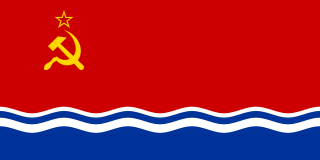
The Latvian Soviet Socialist Republic, also known as Soviet Latvia or simply Latvia, was de facto one of the constituent republics of the Soviet Union between 1940–1941 and 1944–1990.
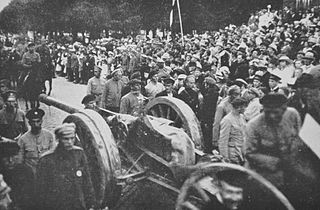
The Latvian War of Independence, sometimes called Latvia's freedom battles or the Latvian War of Liberation, was a series of military conflicts in Latvia between 5 December 1918, after the newly proclaimed Republic of Latvia was invaded by Soviet Russia, and the signing of the Latvian-Soviet Riga Peace Treaty on 11 August 1920.

The Order of Lāčplēsis, the first and the highest Latvian military award, was established in 1919 on the initiative of Jānis Balodis, the Commander of the Latvian Army during the Latvian War of Independence. The Lāčplēsis Order is awarded in the first, second and third class. Initially, a holder of the order had to be a recipient of the third class before being promoted to a higher class. It was named after the Latvian epic hero, Lāčplēsis. As a young man, Lāčplēsis kills a bear with his bare hands and thus the order is also known as the Order of the Bearslayer.

The Latvian Song and Dance Festival is one of the largest amateur choral and dancing events in the world, and an important event in Latvian culture and social life.
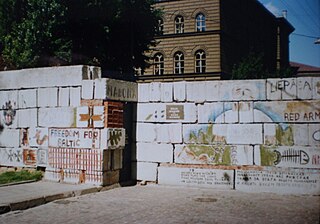
The Barricades were a series of confrontations between the Republic of Latvia and the Union of Soviet Socialist Republics in January 1991 which took place mainly in Riga. The events are named for the popular effort of building and protecting barricades from 13 January until about 27 January. Latvia, which had declared restoration of independence from the Soviet Union a year earlier, anticipated that the Soviet Union might attempt to regain control over the country by force.
The Battle of Cēsis, fought near Cēsis in June 1919, was a decisive battle in the Estonian War of Independence and the Latvian War of Independence. After heavy fighting an Estonian force moving from the north, supplemented by Latvian units, repelled Baltic German attacks and went on full counter-attack.

Lāčplēsis Day is a memorial day for soldiers who fought for the independence of Latvia. It is celebrated on November 11th, marking the decisive victory by the Latvian Army over the joint Russian-German West Russian Volunteer Army led by the warlord Pavel Bermondt-Avalov at the 1919 Battle of Riga during the Latvian War of Independence, thus safeguarding the independence of the nascent nation. It initially was a day of honoring the 743 soldiers that fell in the battles around the Riga area.

The Latvian National Guard or NG is a part of the Latvian National Armed Forces. The National Guard is a basic land component, consisting of volunteers who perform traditional national guard duties such as crisis response and support for military operations. It consists of the Staff Headquarters and 4 brigades, which are divided into 18 battalions. The National Guard continued its development also after Latvia joined NATO.

The following outline is provided as an overview of and topical guide to Latvia:
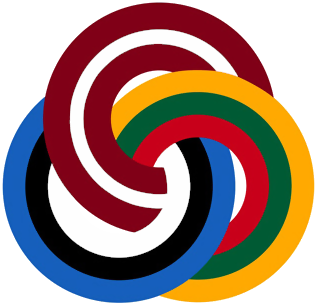
Baltic Pride is an annual LGBT+ pride parade rotating in turn between the capitals of the Baltic states; Tallinn, Riga and Vilnius. It is held in support of raising issues of tolerance and the rights of the LGBT community and is supported by ILGA-Europe. Since 2009, the main organisers have been Mozaīka, the National LGBT Rights Organization LGL Lithuanian Gay League, and the Estonian LGBT Association.
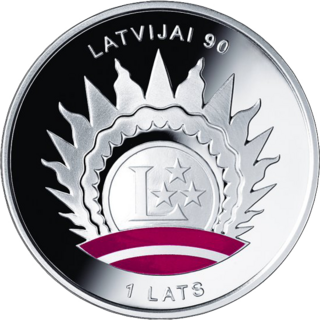
The 90th Anniversary of the Latvian Republic was celebrated in 2008. Proclaimed on November 18, 1918, the Latvian republic asserted independence from Imperial Russia. International de jure recognition was obtained on January 26, 1921.
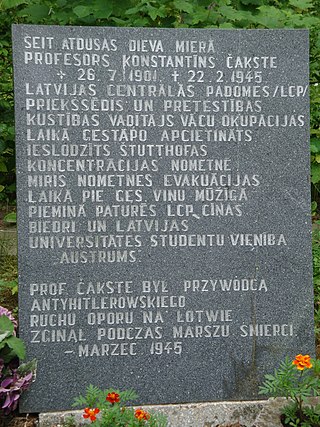
The Latvian Central Council was the pro-independence Latvian resistance movement during World War II from 1943 onwards. The LCC consisted of members from across the spectrum of former leading Latvian politicians and aimed to be the governing body of a democratic Republic of Latvia after the war. Its military units were an alternative to the Soviet partisans also operating in Latvia.
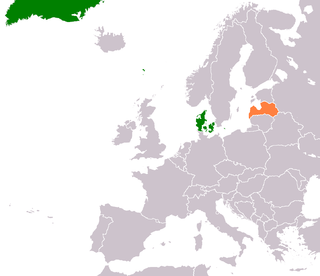
Denmark–Latvia relations refers to the historical and current diplomatic relations between Denmark and Latvia. Denmark has an embassy in Riga and Latvia has an embassy in Copenhagen.

Latvia's Independence Day, officially known as the Proclamation Day of the Republic of Latvia, is celebrated annually on 18 November in Latvia. It marks the anniversary of the Proclamation of Independence of Latvia by the People's Council of Latvia in 1918.
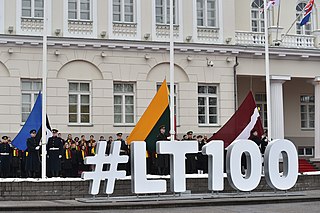
The Centennial of the Restored State of Lithuania marks the 100th anniversary of the Act of Independence of Lithuania which was signed on 16 February 1918.
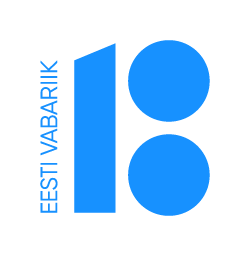
The 100th Anniversary of the Estonian Republic is an official government program for the celebration of the Republic of Estonia's 100th anniversary. The official anniversary was marked on 24 February 2018, while related celebrations and events took place from April 2017 to February 2020.

Day of the Restoration of Latvian Independence is a Latvian national holiday and event, being celebrated annually on 4 May. It marks, like the other Baltic republics, the restoration of the Latvian Republic declaration by the Supreme Soviet of the Latvian SSR on 4 May 1990. This was the official declaration of the Restoration of Independence, and the actual one, that brought also the international recognition, was adopted as a constitutional law "On the Statehood of the Republic of Latvia" by Latvian Supreme Council on 21 August 1991, a day after the Restoration Act of Estonia during August coup. Soviet Union recognised Estonia, Latvia, Lithuania as independent states on 6 September 1991. Russian SFSR did so already on 24 August 1991.






















